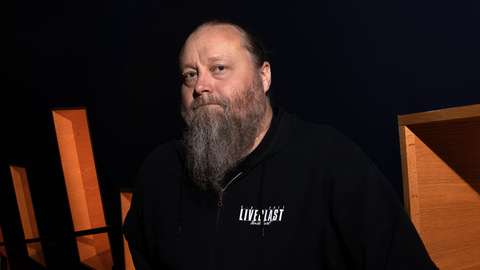For Stage Manager Jari Puhakka, every gig is a learning opportunity
Espoo’s Sello Hall in Leppävaara is a versatile venue where audiences can enjoy theatre and stand-up performances as well as pop and classical concerts. A wide range of performances means that diverse skills are also a requirement for the technical staff. The success and safety of an event require a lot of background work and planning. The Sello Hall team is comprised of all-rounders with strong problem-solving skills.
Learning on the job
In addition to setting up the stage, the Sello Hall's Stage Manager Jari Puhakka is largely responsible for the sound production of events. He says that he became a Stage Manager almost by chance. While he naturally has a basic education, he has learned the actual job by putting in the work.
“Originally, I started on the event production side at Kivenlahti Rock Festival, where I was a construction and festival manager, among other things. After that, I studied media and worked at Kannusali under an apprenticeship agreement. I have also furthered my studies in the field of sound, so I also have a lot of responsibilities at Sellosali involving sound: I prepare gigs, work as a roadie, do mixing for bands, set up mics and so on,” Puhakka lists.
“However, I’ve learned the most at work from my mentors. At each of my workplaces, there have been important people who have taught me. I am also still in touch with many of them,” he says.
Culture in all its forms
Puhakka himself consumes a wide variety of culture, with the possible exception of literature.
“Museums, ballet, opera, heavy music concerts,” he lists.
“My next plan is to attend a pipe organ concert and listen to the new pipe organ at the Helsinki Music Centre,” he adds.
Puhakka also occasionally enjoys concerts at the Sello Hall, but only when he is not on duty.
“During a shift, my focus is on the work and I’m unable to vibe with the performances, even if I am watching and listening to them as I mix. After all, I’m focusing so strongly on the actual work at those times,” he emphasises.
Always room for improvement
While Puhakka has 20 years of experience in the field of events, he is constantly leaning on the job. Each gig is different, and the job continuously presents opportunities for development
“Sometimes, I need to set up tens of microphones for a big band – other times, only a few are needed for stand-up. Both situations are challenging in their own ways – in fact, it sometimes feels like smaller technical requirements make for bigger hurdles. However, challenges make the job interesting.
“Also, if there are any problems, we discuss and try to solve them together. We have a great team here and are able to cover for each other on many occasions”, Puhakka adds.
“Small hiccups are not an issue as long as the whole package works. Besides, if we learn even one thing during each gig that we could have done differently – not necessarily better, just differently – that’s always a step in the right direction”, he emphasises.
Good vibes at work make for a good show
What is the most important part of a Stage Manager's job, then? Puhakka wants to highlight an aspect that may not be the first thing on many people's minds: safety.
“It is a given that all events should be safe as a rule, but the safety of the performers, which includes everything from the performance environment to good vibes, is also important. I always try to greet the performers and help them where necessary. When the performers are enjoying the show, the resulting gig is usually a good one. That is when I feel like I’ve succeeded at my own job,” he summarises.
Jari Puhakka’s cultural tips
Jari Puhakka has lived in Espoo for nearly half a decade. He feels that the cultural scene is strong here, but, much like the city itself, it is spread out across different urban centres.
“In my view, Espoo is fragmented – for example, I see myself more as a resident of Kivenlahti than as a resident of Espoo. As for examples of culture, Olari at least used to have a strong rap scene, while Kivenlahti leaned more towards rock music. In other words, different districts have had a strong built-in cultural identity, though there was never any conflict,” he says.
“However, that could have changed these days. Also, Espoo’s cultural scene has expanded and improved significantly over the last two decades,” Puhakka concludes.
Puhakka, who enjoys a wide variety of culture, has also selected a diverse range of events as his cultural tips:
6 Feet Underground – Metal Festival (14 February –15 February Kannusali)
“This event is also interesting to me, because I used to work at Kannusali The building alone makes Kannusali worth at least a one-time visit. The concert hall is built in an underground shelter, which makes it a fascinating and unusual setting.”
Marjo Leinonen & Bublicans (22 February, Espoo Cultural Centre, Louhisali)
“This is another concert that I would like to attend, but it will probably coincide with a work shift. However, everyone else should attend.”
Guided tours on Wednesdays in Finnish at Glims Farmstead Museum
“This is definitely a place I will visit in February.”
